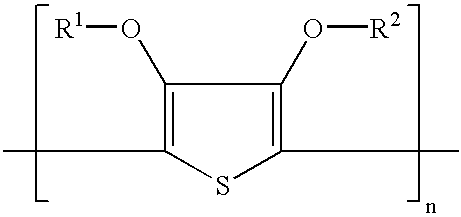Flexographic ink containing a polymer or copolymer of a 3,4-dialkoxythiophene
a technology of dimethyl thiophene and ink, which is applied in the direction of inks, film/foil adhesives, printing, etc., can solve the problems of poor adhesion and poor resistance of inorganic semiconductors to abrasion of inks, and achieves poor adhesion, poor resistance to abrasion, and high optical density.
- Summary
- Abstract
- Description
- Claims
- Application Information
AI Technical Summary
Benefits of technology
Problems solved by technology
Method used
Image
Examples
invention examples 1 to 6
[0160]The flexographic inks of INVENTION EXAMPLES 1 to 6 were prepared by adding with mixing the ingredients in the quantities given in Table 3 to 45 g of a 3% by weight dispersion of PEDOT / PSS in water after mixing with the deionized water.
[0161]
TABLE 3Invention Example nr1234563 wt % aq. disp. PEDOT / 454545454545PSS [g]DW [g]23.423.423.125.123.124.1LATEX14 [g]1.81.81.81.81.81.8LATEX22 [g]1.41.41.41.41.41.4PD [g]2.52.52.52.52.52.5DEG-MME [g]4.54.54.54.54.54.5DEG [g]7.07.07.07.07.07.0SURFYNOL ™ 440 [g]0.70.70.70.70.70.7X-50-860A [g]0.10.10.10.10.10.1Isopropanol [g]101010101010PIG01 (30%) [g]—3.7————PIG02 (30%) [g]——4.0———PIG03 (30%) [g]———2.0——PIG04 (30%) [g]————4.0—PIG05 (30%) [g]———3.0Total [g]:96.4100.1100.1100.1100.1100.1wt % water in aq. medium70.271.271.171.371.171.2Viscosity [mPa.s]200745470215320615
[0162]The flexographic inks of INVENTION EXAMPLE 1 was non-pigmented and those of INVENTION EXAMPLES 2 to 6 were pigmented. The flexographic ink of INVENTION EXAMPLE 2 was coloured...
invention example 7
[0168]The non-pigmented flexographic ink of INVENTION EXAMPLE 7 was prepared by adding with mixing the ingredients in the quantities given in Table 5 to 450 g of a 3% by weight dispersion of PEDOT / PSS in water after mixing with the deionized water.
[0169]
TABLE 53 wt % aqueous PEDOT / PSS dispersion [g]45013.5 (solids)DW [g]172.5—LATEX21 [g]37.515.0 (solids)LATEX22 [g]14 4.2 (solids)PD [g]25—DEG-MME [g]45—DEG [g]70—SYNPERONIC ™ 13 / 6.55 (100%) [g]10 10 (solids)X-50-860A [g]1.0 1.0 (solids)isopropanol [g]200—Total [g]:102543.7 (solids)wt % water in aqueous medium60.1Viscosity [mPa · s]750
[0170]The viscosity of the flexographic inks was determined at 25° C. according to DIN 53211 using a DIN 4 cup by stirring the flexographic ink until a constant emptying time is measured. Standard conversion tables are used to convert the emptying times into dynamic viscosities (cSt) and a density of 1 is assumed in converting the dynamic viscosities values into mPa.s.
Flexographic Printing
[0171]The flexo...
invention examples 8 to 19
The non-pigmented flexographic ink of INVENTION EXAMPLES 8 to 19 were prepared by adding with mixing the ingredients in the quantities given in Table 7 to 45 g of a 3% by weight dispersion of PEDOT / PSS in water after mixing with the deionized water.
[0174]The viscosity of the flexographic inks was determined at 25° C. according to DIN 53211 using a DIN 4 cup by stirring the flexographic ink until a constant emptying time is measured. Standard conversion tables were used to convert the emptying times into dynamic viscosities (cSt) and a density of 1 was assumed in converting the dynamic viscosities values into mpa.s.
[0175]
TABLE 7Invention Example nr89101112133% aq. PEDOT / PSS disp. [g]454545454545DW [g]24.211.724.211.724.211.7LATEX14 [g]1.81.81.81.81.81.8LATEX22 [g]1.41.41.41.41.41.4PD [g]2.52.52.52.52.52.5DEG-MME [g]4.54.54.54.54.54.5DEG [g]7.07.07.07.07.07.0ZONYL ™ FSO100 [g]1.051.051.051.051.051.05X50-860A [g]0.10.10.10.10.10.1isopropanol [g]12.525————n-propanol [g]——12.525——isobuta...
PUM
| Property | Measurement | Unit |
|---|---|---|
| viscosity | aaaaa | aaaaa |
| speeds | aaaaa | aaaaa |
| viscosity | aaaaa | aaaaa |
Abstract
Description
Claims
Application Information
 Login to View More
Login to View More - R&D
- Intellectual Property
- Life Sciences
- Materials
- Tech Scout
- Unparalleled Data Quality
- Higher Quality Content
- 60% Fewer Hallucinations
Browse by: Latest US Patents, China's latest patents, Technical Efficacy Thesaurus, Application Domain, Technology Topic, Popular Technical Reports.
© 2025 PatSnap. All rights reserved.Legal|Privacy policy|Modern Slavery Act Transparency Statement|Sitemap|About US| Contact US: help@patsnap.com



